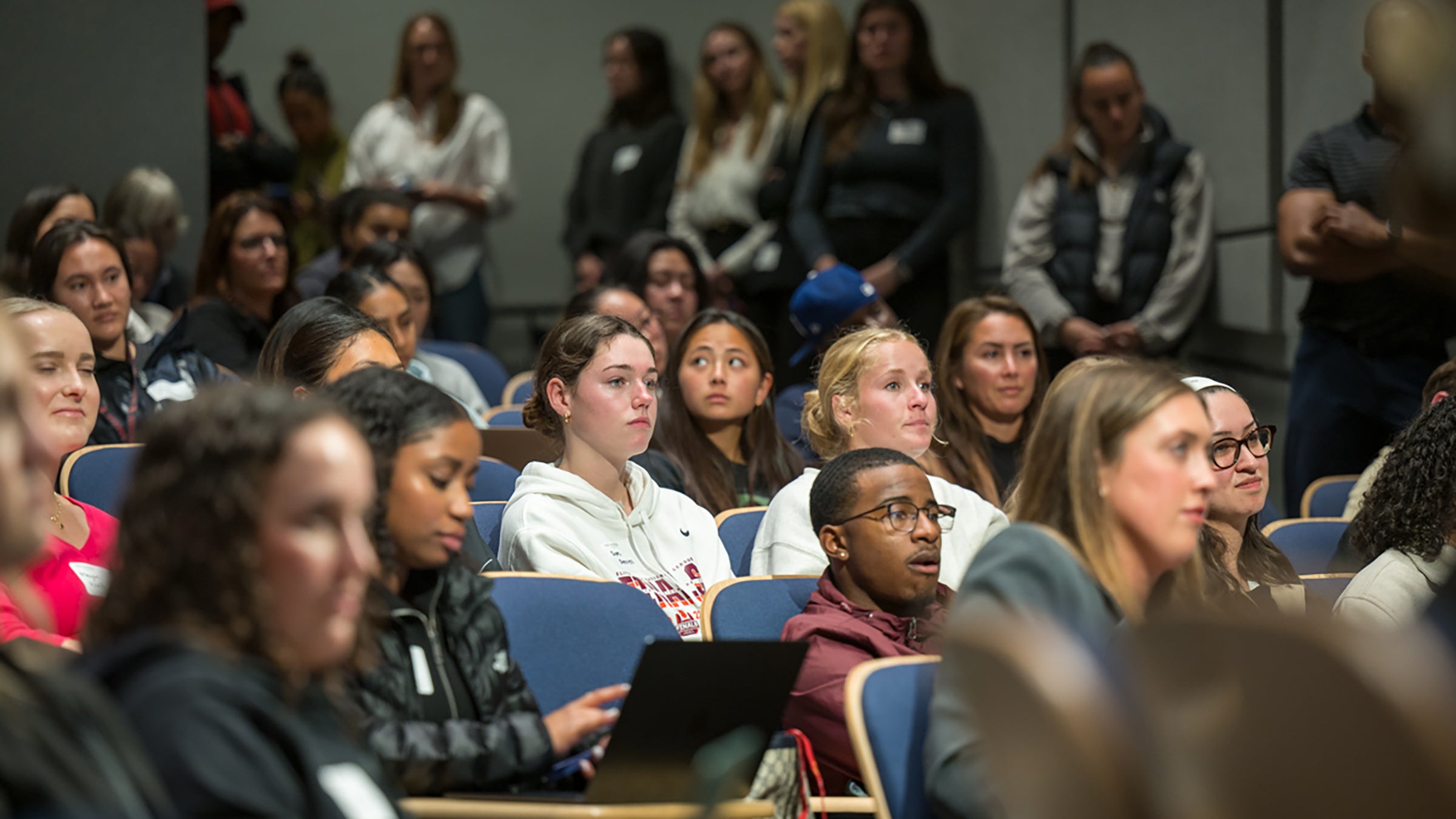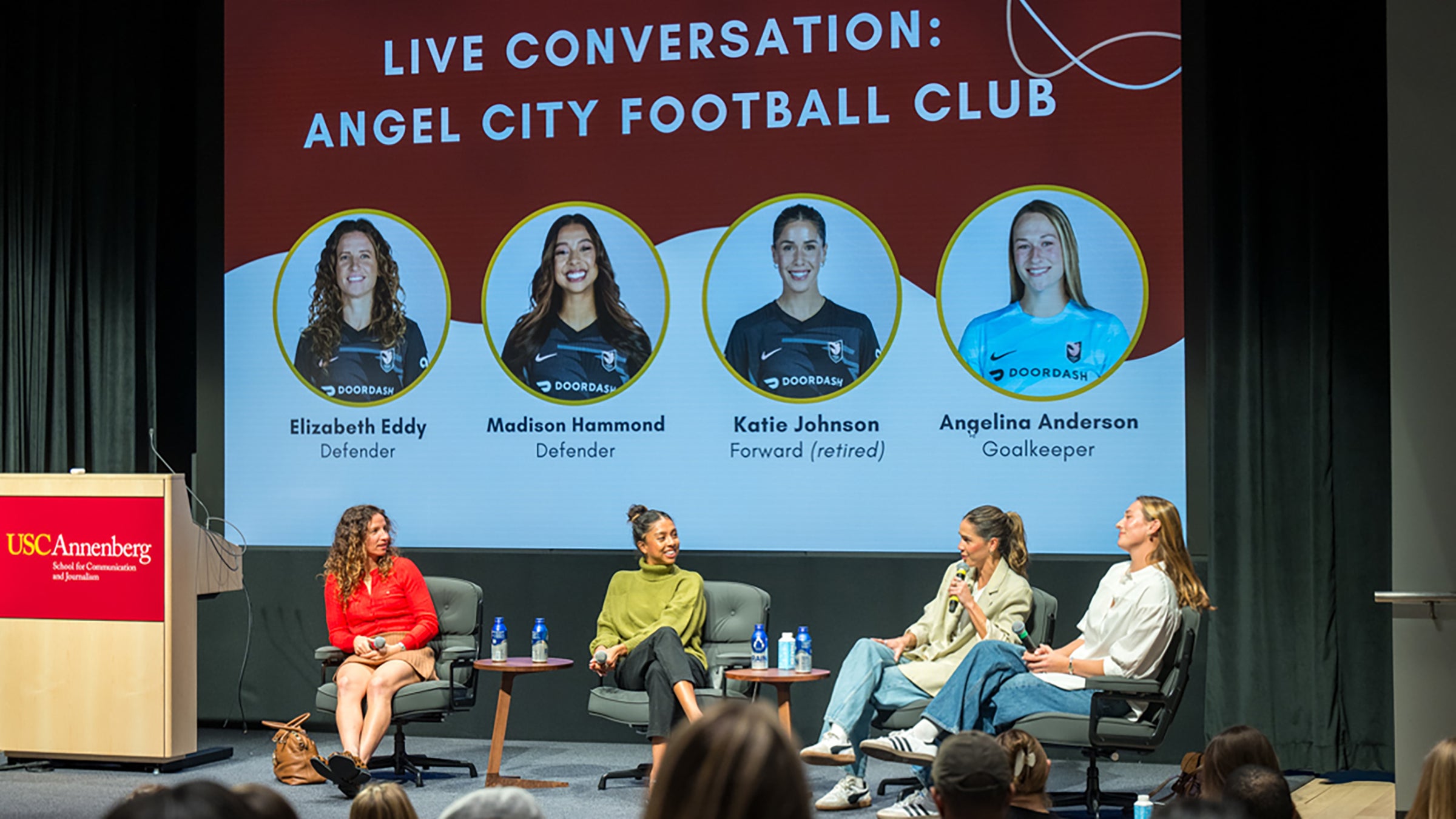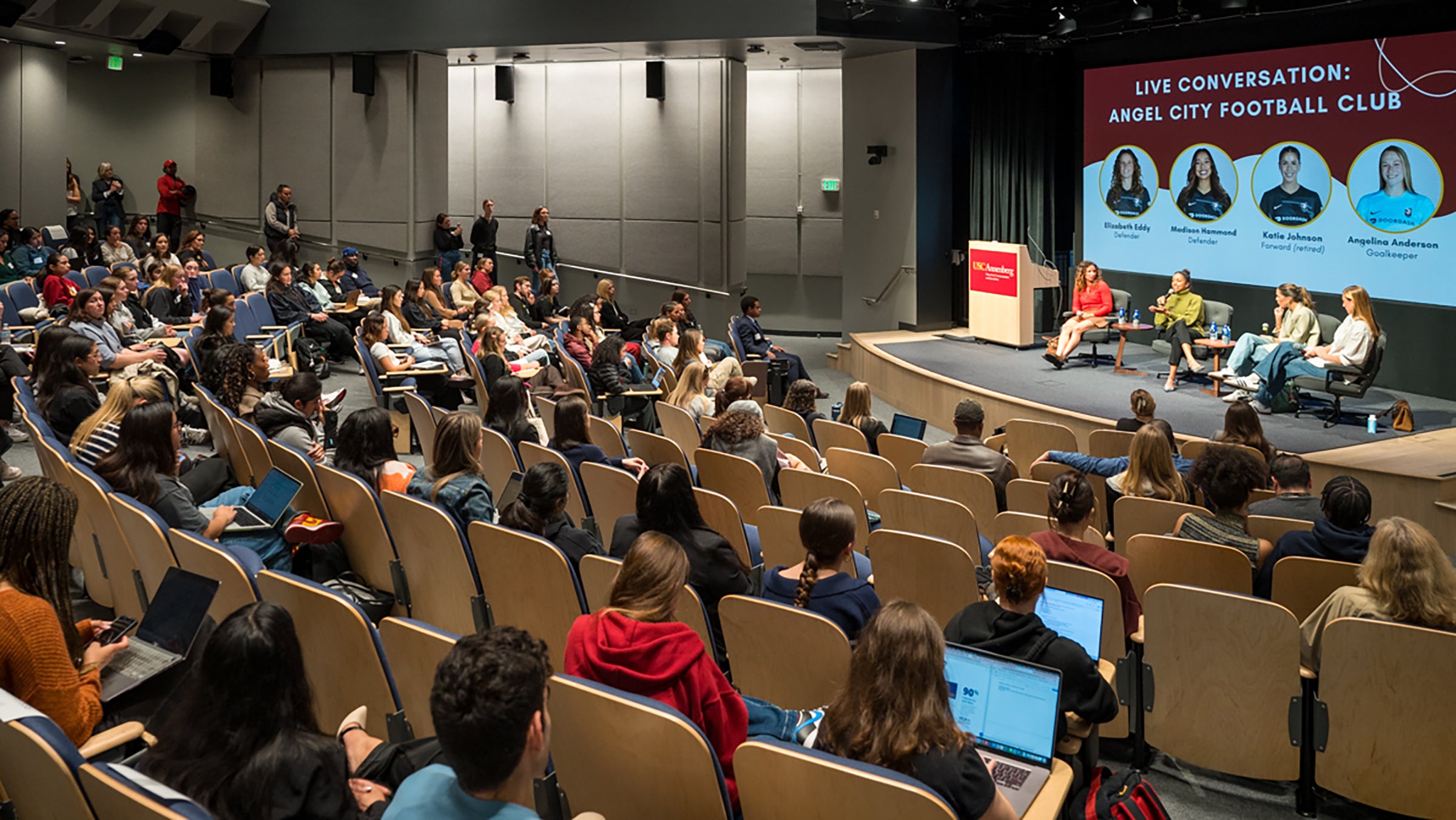Amy Trask sat in front of a crowded auditorium on USC’s University Park Campus on Wednesday afternoon and encouraged all in attendance to embrace new opportunities, regardless of how intimidating they might be. After all, this strategy seems to have worked out well for Trask. As a student at the USC Gould School of Law in 1983, Trask — on a whim — called the front office of the then-Los Angeles Raiders to ask if she could intern with the organization.
“They said, ‘What’s an intern?’ and I said, ‘Well, I’ll work for you, and you won’t pay me,’” Trask said. “They said, ‘Come on down.’”
Trask rode that cold call into a career with the Raiders that spanned almost 30 years, becoming the team’s — and the NFL’s — first female CEO.

Trask was one of nine industry-leading women who were part of the National Girls & Women in Sports Day celebration co-sponsored by USC Gould and the USC Annenberg School for Communication and Journalism. The event featured three panels, each with speakers who are breaking barriers and inspiring the next generation of women in sports, followed by a networking session for students to make connections and ask for advice in their own careers.
“When I joined the Raiders in the mid-’80s and I walked into my first league owners meeting, there were no other women there,” Trask said. “I could have spent time thinking about that, but if I don’t want anyone else thinking about the fact that I’m a woman, why am I wasting my time thinking about the fact that I’m a woman?”
National Girls & Women in Sports Day: Breaking in and setting the tone
Trask was one of three panelists in a 40-minute discussion on trailblazing women in the sports industry. The other two trailblazers were Jennifer Lewis, general counsel for the L.A. Clippers, and Courtney Moore, vice president of diversity, equity and inclusion for the L.A. Dodgers. Each woman — all of whom have law degrees — spoke about her path to professional sports and the hard lessons learned along the way.
Though a career in sports was each woman’s main goal, the panelists shared that they had previously considered roles in different industries. Trask worked at a law firm for a year before the Raiders hired her for a full-time position. Lewis worked in the entertainment industry for 26 years before the Clippers called her.
“If you create kind of that North Star about you, like, ‘This is who I am. This is what I deliver, and this is how I do my job,’ I think you’re going to be successful,” Lewis said.
Though Moore had previously worked for her hometown Chicago White Sox, she was overseeing diversity efforts for a law firm in L.A. when the Dodgers reached out.
“The murder of George Floyd opened up and created a different space and a different lens in terms of how sports teams looked at diversity, equity, inclusion,” Moore said. “I would say the challenge was to come into a new space and educate everyone on why this is so important for the Dodgers to be doing this.”
Growing women’s professional sports: National Girls & Women in Sports Day
Apart from Trask, Wednesday’s event was a homecoming for other Trojan panelists. Former USC soccer players Elizabeth Eddy and Katie Johnson shared a panel with fellow Angel City FC players Madison Hammond and Angelina Anderson. Eddy moderated the discussion, which ranged from the growth of women’s professional soccer, each panelist’s path to Angel City FC and how the club is changing the sport.

Angel City FC officially launched in 2020 and played its first season in the National Women’s Soccer League in 2022. The team’s inaugural season marked the first time the L.A. area has had a women’s professional soccer team since the L.A. Sol of Women’s Professional Soccer folded in 2010. Angel City FC was established with a majority female ownership group led by actress Natalie Portman, venture capitalist Kara Nortman, entrepreneur Julie Uhrman and venture capitalist Alexis Ohanian. Last year, USC Annenberg Dean Willow Bay and her husband, CEO Bob Iger of The Walt Disney Co., purchased a controlling stake in the club.
“Angel City has fully committed to that vision of giving you an excellent product,” Hammond said. “This vision isn’t just for this moral sense of goodness in your heart: You should invest your time, your spirit and your fandom into women’s sports because we’re good at what we do.”
Eddy and Johnson were teammates on the USC women’s soccer team for the 2012 and 2013 seasons, with the latter playing on the Trojan national championship team in 2016.
“I definitely take some pride when I see younger players not having to worry about where they’re going to live, having to stay with a host family, or just the little things that they don’t have to worry about,” said Johnson, who announced her retirement from Angel City FC in December.
Maximizing USC’s resources
After afternoon sessions that included some of the biggest game-changers on the field and in the front office, the third panel focused on two changemakers in the world of sports branding: Olivia Cheng, senior director of marketing and brand engagement at LA28, L.A.’s 2028 Olympic and Paralympic Games, and Allison Galer, founder of Disrupt the Game, a sports representation agency. Though both women ended up with a career in sports, they took very different routes.
Cheng worked her way up through collegiate and professional sports organizations on the East Coast — including the Philadelphia 76ers — before landing a role with LA28. Galer, an L.A. native, interned with the WNBA’s L.A. Sparks while still in high school, before playing basketball at Brown University. A year after graduating from Brown, Galer returned to the West Coast to start her agency, where she secured high-profile clients such as the Sparks and Trojan legend Lisa Leslie.
“When Lisa and I met, she was looking for someone that was going to go hustle for her,” Galer said. “A lot of it was just showing her that I was going to put in the work because no one else would.”
Both Cheng and Galer extolled the value of hustle and networking to USC student attendees while emphasizing that their university would provide them with a good foundation. Though neither Cheng nor Galer attended USC, they praised the university’s resources and the caliber of its students.
“You are at USC, so there are no excuses,” Cheng said. “If you want to get in the sports industry, you have one of the best chances, and you’re in the best city. This is the sports capital of the United States, if not the world, so if an ’SC student tells me that they’re coming in with zero experience, I find that hard to believe.”



